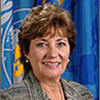Intestinal worms, blinding parasites, blood flukes — it may come as a surprise for many that these threats are not only confined to developing nations or remote parts of the world. In fact, about 150 countries are endemic for at least one kind of neglected tropical disease, which affect 1 in 6 people worldwide.
What’s more, about 65 percent of people who need treatments for the most common NTDs live in middle-income countries — a reflection of the pervasiveness of these diseases affecting the poorest people even as the world works toward greater shared prosperity.
Let’s take a look at Brazil, Russia, India, China and South Africa — known as the BRICS group of nations. These emerging markets represent some of the world’s leading economies — four are among the 10 largest gross domestic products worldwide, and all five combined make up about 25 percent of the world’s GDP.






